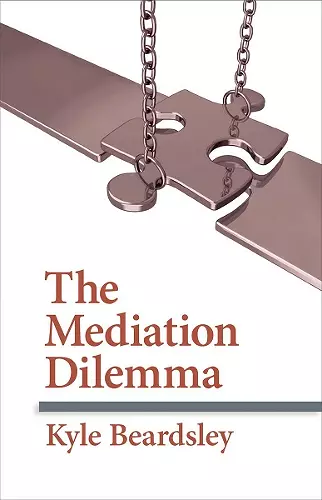The Mediation Dilemma
Format:Hardback
Publisher:Cornell University Press
Published:15th Sep '11
Currently unavailable, and unfortunately no date known when it will be back

Mediation has become a common technique for terminating violent conflicts both within and between states; while mediation has a strong record in reducing hostilities, it is not without its own problems. In The Mediation Dilemma, Kyle Beardsley highlights its long-term limitations. The result of this oft-superficial approach to peacemaking, immediate and reassuring as it may be, is often a fragile peace. With the intervention of a third-party mediator, warring parties may formally agree to concessions that are insupportable in the long term and soon enough find themselves at odds again.
Beardsley examines his argument empirically using two data sets and traces it through several historical cases: Henry Kissinger's and Jimmy Carter's initiatives in the Middle East, 1973–1979; Theodore Roosevelt's 1905 mediation in the Russo-Japanese War; and Carter's attempt to mediate in the 1994 North Korean nuclear crisis. He also draws upon the lessons of the 1993 Arusha Accords, the 1993 Oslo Accords, Haiti in 1994, the 2002 Ceasefire Agreement in Sri Lanka, and the 2005 Memorandum of Understanding in Aceh. Beardsley concludes that a reliance on mediation risks a greater chance of conflict relapse in the future, whereas the rejection of mediation risks ongoing bloodshed as war continues.
The trade-off between mediation's short-term and long-term effects is stark when the third-party mediator adopts heavy-handed forms of leverage, and, Beardsley finds, multiple mediators and intergovernmental organizations also do relatively poorly in securing long-term peace. He finds that mediation has the greatest opportunity to foster both short-term and long-term peace when a single third party mediates among belligerents that can afford to wait for a self-enforcing arrangement to be reached.
"By definition, mediation efforts are limited to negotiation and the provision of information, so there has been considerable skepticism about whether this kind of intervention has any lasting effects. Kyle Beardsley shows convincingly that there are indeed substantive effects, but they are often ephemeral. The Mediation Dilemma provides the defining statement about what we know and do not know about international third-party mediation." -- Allan Stam, University of Michigan, author of Win, Lose, or Draw: Domestic Politics and the Crucible of War
"In this well-written book that should be of interest to scholars and practitioners alike, Kyle Beardsley shows that third-party mediation can obtain short-term peace at the cost of long-term stability, but that certain factors—such as coordination—mitigate this tradeoff. The theoretical approach draws on bargaining theory and the analysis is both rigorous and accessible, employing case studies and statistics. The Mediation Dilemma is an outstanding contribution to the international conflict management field." -- Scott Sigmund Gartner, Penn State University
"Kyle Beardsley has written a brilliant book, based on careful and persuasive research, tackling central questions for mediators of international conflict: when and how much to intervene. His findings are striking and should be contemplated by everyone interested in conflict-resolution: While heavy-handed mediation can reduce the short-term intensity of conflict, it seems to make long-term resolution more difficult." -- Shibley Telhami, Anwar Sadat Professor for Peace and Development, the University of Maryland, and Senior Fellow, the Brookings Institution
"Most mediation studies are myopic, concerned only with the achievement of an agreement and not its long-term effects on actor behavior. Kyle Beardsley's work is a fruitful exception, linking short-term outcomes to long-term problems and doing so in a theoretically and empirically informed fashion." -- Paul F. Diehl, Henning Larsen Professor, University of Illinois
- Winner of A 2012 Choice Magazine "Outstanding Academic Title.
ISBN: 9780801450037
Dimensions: 235mm x 155mm x 22mm
Weight: 907g
256 pages